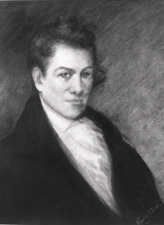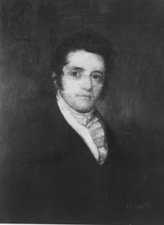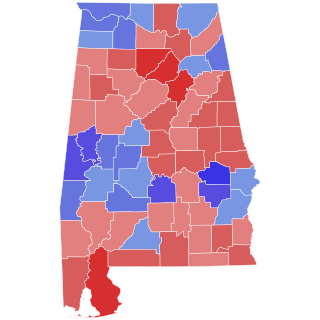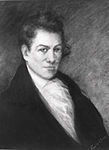
Israel Pickens was an American politician and lawyer, third Governor of the U.S. state of Alabama (1821–1825), member of the North Carolina Senate (1808–1810), and United States Congressman from North Carolina in the United States House of Representatives (1811–1817).

Henry H. Chambers was an American politician, who served as the Jacksonian U.S. senator from the state of Alabama from March 4, 1825 until his death. He was replaced by Israel Pickens until a replacement, John McKinley, could be elected.

Gabriel Moore was a Democratic-Republican, later Jacksonian and National Republican politician and fifth governor of the U.S. state of Alabama (1829–1831).

The 2006 Alabama gubernatorial election occurred on November 7, 2006. Incumbent Republican Governor Bob Riley defeated Democratic Lieutenant Governor Lucy Baxley. Riley garnered 21% of African Americans' votes.

The 1982 Alabama gubernatorial election was held on November 2, 1982, to elect the governor of Alabama. Incumbent Democrat Fob James declined to run for re-election; he later successfully ran again in 1994 as a Republican. The open seat election saw former Democratic governor George Wallace, who narrowly won the Democratic primary, defeat Republican Emory Folmar, the Mayor of Montgomery, Alabama.

The 1964 United States presidential election in Alabama was held on November 3, 1964. Alabama voters chose ten representatives, or electors, to the Electoral College, who voted for President and Vice-president. In Alabama, voters voted for electors individually instead of as a slate, as in the other states.

The 1986 Alabama gubernatorial election saw the election of Republican H. Guy Hunt over Democrat Bill Baxley. In state politics, this election is largely seen as a realigning election since Hunt was the first Republican to be elected governor in 114 years – the last Republican to be elected was David P. Lewis in 1872 during the Reconstruction era. In March 1986, incumbent George Wallace announced that he would not seek a fifth term as governor, ending an era in Alabama politics.

The 2000 United States elections were held on November 7, 2000. Republican governor George W. Bush of Texas defeated Democratic Vice President Al Gore of Tennessee in the presidential election. Republicans retained control of both houses of Congress, giving the party unified control of Congress and the presidency for the first time since the 1954 elections.

The 2010 Alabama gubernatorial election took place on November 2, 2010. Incumbent Governor Bob Riley was term-limited and unable to seek re-election. The party primaries were held on June 1, 2010, with a Republican runoff on July 13. In the general election, Robert J. Bentley defeated Democrat Ron Sparks. This was the first election in which Republicans won three consecutive gubernatorial elections in the state. This was also the first time since Reconstruction that a Republican carried Colbert County, Franklin County, and Lawrence County in a gubernatorial race.

The 1992 United States presidential election in Alabama took place on November 3, 1992, as part of the 1992 United States presidential election. Voters chose nine representatives, or electors to the Electoral College, who voted for president and vice president.

The 1822–23 United States Senate elections were held on various dates in various states. As these U.S. Senate elections were before the ratification of the Seventeenth Amendment in 1913, senators were chosen by state legislatures. Senators were elected over a wide range of time throughout 1822 and 1823, and a seat may have been filled months late or remained vacant due to legislative deadlock. In these elections, terms were up for the senators in Class 2.

Elections in Alabama are authorized under the Alabama State Constitution, which establishes elections for the state level officers, cabinet, and legislature, and the election of county-level officers, including members of school boards.

The 1976 United States presidential election in Alabama took place on November 2, 1976, as part of the 1976 presidential election. Voters chose nine representatives, or electors, to the Electoral College, who voted for president and vice president.

The 1968 United States presidential election in Alabama was held on November 5, 1968. In Alabama, voters voted for electors individually instead of as a slate, as in the other 49 states.

In the 1977 Virginia gubernatorial election, incumbent Governor Mills E. Godwin, Jr., a Republican, was unable to seek re-election due to term limits. John N. Dalton, the Lieutenant Governor of Virginia, was nominated by the Republican Party to run against the Democratic nominee, former Lieutenant Governor of Virginia Henry Howell.

The 1860 United States presidential election in Alabama took place on November 6, 1860, as part of the 1860 United States presidential election. Alabama voters chose nine representatives, or electors, to the Electoral College, who voted for president and vice president.

The 1821 Alabama gubernatorial election was held on August 6, 1821, to elect the third governor of Alabama. Democratic-Republican candidate Israel Pickens defeated fellow Democratic-Republican candidate Henry H. Chambers with 57.43% of the vote.

The 1825 Alabama gubernatorial election was an uncontested election held on August 1, 1825, to elect the governor of Alabama. Jacksonian candidate John Murphy ran unopposed and so won 100% of the vote.

The 1831 Alabama gubernatorial election was an election held on August 1, 1831, to elect the governor of Alabama. Jacksonian candidate John Gayle beat the incumbent Jacksonian governor Samuel B. Moore and National Republican candidate Nicholas Davis with 55.01% of the vote.

The 1823 Rhode Island gubernatorial election was an uncontested election held on April 16, 1823 to elect the governor of Rhode Island. William C. Gibbs, the Democratic-Republican nominee, was the only candidate and so won with 100% of the vote.






















